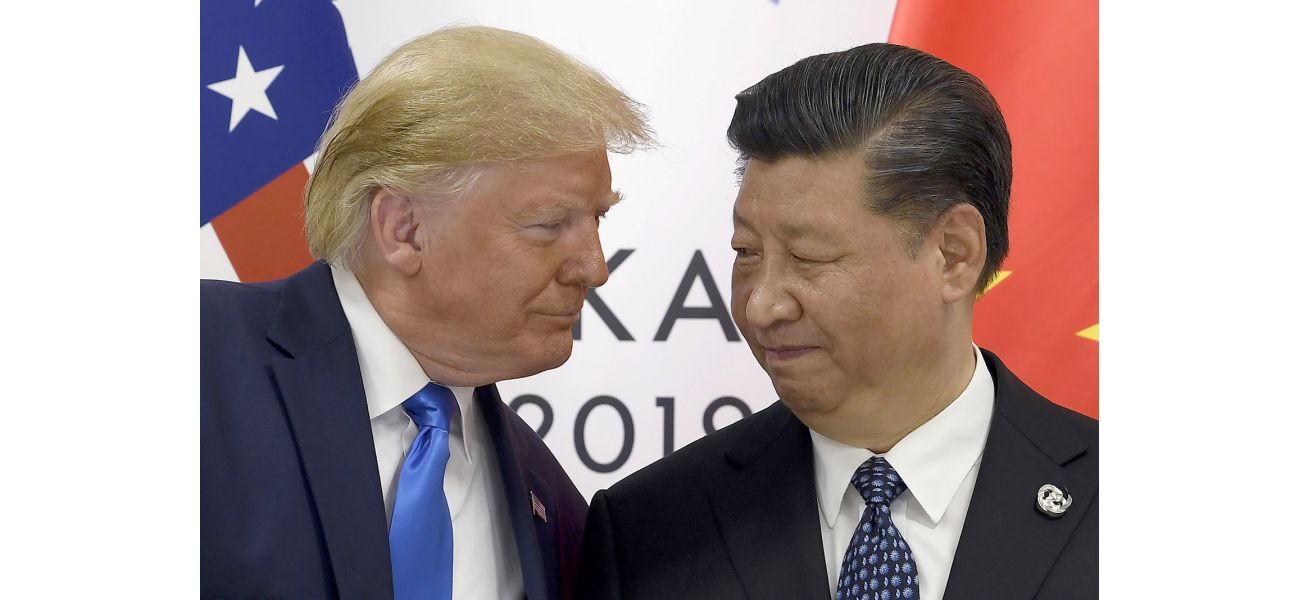Trump plans to impose tariffs on Mexico, Canada, and China immediately upon taking office.
The speaker announced that the tariffs would continue until there is an end to the influx of drugs, especially Fentanyl, and illegal immigrants into the country.
November 26th 2024.

The newly elected US president, Donald Trump, has announced his intentions to impose heavy tariffs on Mexico, Canada, and China once he takes office. This move is part of his efforts to tackle illegal immigration and drug trafficking, which he believes are pressing issues facing the country.
If these tariffs are put into effect, it could have a significant impact on the prices of various goods, ranging from gas to automobiles. According to recent Census data, the US is the largest importer of goods in the world, with Mexico, China, and Canada being its top three suppliers.
Trump took to his Truth Social site on Monday evening to express his frustration with the influx of illegal migrants, despite the fact that southern border crossings have been at a four-year low. In his posts, he stated that one of his first executive orders on January 20th will be to impose a 25% tariff on all products coming from Mexico and Canada. He also criticized the "ridiculous open borders" and claimed that these countries are responsible for bringing in "crime and drugs at levels never seen before." However, statistics show that violent crime has actually decreased since the peak of the pandemic.
In addition to Mexico and Canada, Trump also turned his attention to China, stating that he has had numerous talks with them about the massive amounts of drugs, particularly Fentanyl, being sent to the US. He claims that his efforts have been fruitless, and as a result, he plans to impose an additional 10% tariff on all Chinese products entering the US.
It is uncertain if Trump will follow through with these threats or if they are merely a negotiating tactic before he officially takes office. However, if he does implement these tariffs, it could have a significant impact on the economies of Canada and Mexico, and it may also jeopardize the 2020 trade deal that was brokered during his presidency.
Some of Trump's nominees, including his pick for treasury secretary, Scott Bessent, have expressed support for using tariffs as a means of negotiation with other countries. Bessent believes that tariffs can play a vital role in achieving the president's foreign policy objectives, such as securing cooperation on issues such as defense spending, opening foreign markets to US exports, and deterring military aggression.
The implementation of these tariffs would not only have economic implications but also affect the relationship between the US and its neighboring countries. Canada's ambassador to Washington and the deputy prime minister, Chrystia Freeland, who chairs a special committee on Canada-US relations, have not yet commented on Trump's threats. However, they have previously stated that the mass deportation of undocumented immigrants is a top concern for their committee.
Mexican officials have also not responded to Trump's statements, but they are expecting him to issue executive orders on trade and border issues once he takes office. If these tariffs are put into effect, it would pose a significant challenge for Mexico's economy and could potentially strain the 2026 trade deal that was brokered by Trump.
In conclusion, Trump's proposed tariffs have caused concern and uncertainty among the US's neighboring countries. It remains to be seen if he will follow through with these threats or use them as a bargaining chip as he prepares to take office.
If these tariffs are put into effect, it could have a significant impact on the prices of various goods, ranging from gas to automobiles. According to recent Census data, the US is the largest importer of goods in the world, with Mexico, China, and Canada being its top three suppliers.
Trump took to his Truth Social site on Monday evening to express his frustration with the influx of illegal migrants, despite the fact that southern border crossings have been at a four-year low. In his posts, he stated that one of his first executive orders on January 20th will be to impose a 25% tariff on all products coming from Mexico and Canada. He also criticized the "ridiculous open borders" and claimed that these countries are responsible for bringing in "crime and drugs at levels never seen before." However, statistics show that violent crime has actually decreased since the peak of the pandemic.
In addition to Mexico and Canada, Trump also turned his attention to China, stating that he has had numerous talks with them about the massive amounts of drugs, particularly Fentanyl, being sent to the US. He claims that his efforts have been fruitless, and as a result, he plans to impose an additional 10% tariff on all Chinese products entering the US.
It is uncertain if Trump will follow through with these threats or if they are merely a negotiating tactic before he officially takes office. However, if he does implement these tariffs, it could have a significant impact on the economies of Canada and Mexico, and it may also jeopardize the 2020 trade deal that was brokered during his presidency.
Some of Trump's nominees, including his pick for treasury secretary, Scott Bessent, have expressed support for using tariffs as a means of negotiation with other countries. Bessent believes that tariffs can play a vital role in achieving the president's foreign policy objectives, such as securing cooperation on issues such as defense spending, opening foreign markets to US exports, and deterring military aggression.
The implementation of these tariffs would not only have economic implications but also affect the relationship between the US and its neighboring countries. Canada's ambassador to Washington and the deputy prime minister, Chrystia Freeland, who chairs a special committee on Canada-US relations, have not yet commented on Trump's threats. However, they have previously stated that the mass deportation of undocumented immigrants is a top concern for their committee.
Mexican officials have also not responded to Trump's statements, but they are expecting him to issue executive orders on trade and border issues once he takes office. If these tariffs are put into effect, it would pose a significant challenge for Mexico's economy and could potentially strain the 2026 trade deal that was brokered by Trump.
In conclusion, Trump's proposed tariffs have caused concern and uncertainty among the US's neighboring countries. It remains to be seen if he will follow through with these threats or use them as a bargaining chip as he prepares to take office.
[This article has been trending online recently and has been generated with AI. Your feed is customized.]
[Generative AI is experimental.]
0
0
Submit Comment





